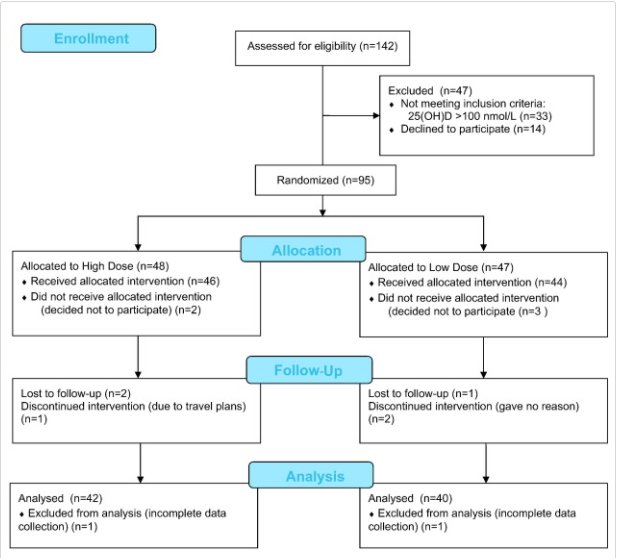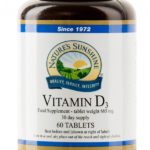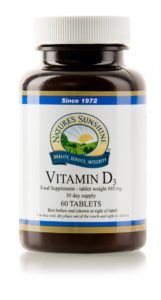BACKGROUND:
Insufficiency of 25-hydroxyvitamin D [25(OH)D] has been associated with dementia and cognitive decline. However, the effects of vitamin D supplementation on cognition are unclear. It was hypothesized that high dose vitamin D3 supplementation would result in enhanced cognitive functioning, particularly among adults whose 25(OH)D levels were insufficient (<75nmol/L) at baseline.
METHODS:
Healthy adults (n=82) from northern British Columbia, Canada (54° north latitude) with baseline 25(OH)D levels ≤100nmol/L were randomized and blinded to High Dose (4000IU/d) versus Low Dose (400IU/d) vitamin D3 (cholecalciferol) for 18weeks. Baseline and follow-up serum 25(OH)D and cognitive performance were assessed and the latter consisted of: Symbol Digit Modalities Test, verbal (phonemic) fluency, digit span, and the CANTAB® computerized battery.

RESULTS:
There were no significant baseline differences between Low (n=40) and High (n=42) dose groups. Serum 25(OH)D increased significantly more in the High Dose (from 67.2±20 to 130.6±26nmol/L) than the Low Dose group (60.5±22 to 85.9±16nmol/L), p=0.0001. Performance improved in the High Dose group on nonverbal (visual) memory, as assessed by the Pattern Recognition Memory task (PRM), from 84.1±14.9 to 88.3±13.2, p=0.043 (d=0.3) and Paired Associates Learning Task, (PAL) number of stages completed, from 4.86±0.35 to 4.95±0.22, p=0.044 (d=0.5), but not in the Low Dose Group. Mixed effects modeling controlling for age, education, sex and baseline performance revealed that the degree of improvement was comparatively greater in the High Dose Group for these tasks, approaching significance: PRM, p=0.11 (d=0.4), PAL, p=0.058 (d=0.4). Among those who had insufficient 25(OH)D (<75nmol/L) at baseline, the High Dose group (n=23) improved significantly (p=0.005, d=0.7) and to a comparatively greater degree on the PRM (p=0.025, d=0.6).
CONCLUSIONS:
Nonverbal (visual) memory seems to benefit from higher doses of vitamin D supplementation, particularly among those who are insufficient (<75nmol/L) at baseline, while verbal memory and other cognitive domains do not. These findings are consistent with recent cross-sectional and longitudinal studies, which have demonstrated significant positive associations between 25(OH)D levels and nonverbal, but not verbal, memory. While our findings require confirmation, they suggest that higher 25(OH)D is particularly important for higher-level cognitive functioning, specifically nonverbal (visual) memory, which also utilizes executive functioning processes.
Pettersen J.A1. (2017). Does high dose vitamin D supplementation enhance cognition?: A randomized trial in healthy adults. Exp Gerontol. Apr; 90:90-97. doi: 10.1016/j.exger.2017.01.019.

Often referred to as ‘the sunshine vitamin’, Vitamin D is generally acquired by the body in two ways; exposure to the sun’s ultraviolet (UV) rays and dietary intake, so supplementation is especially important during the colder, darker months of the year when we see very little sunshine.
- Vitamin D is an important vitamin for maintaining the good health of bones and teeth, and is required to help our bodies absorb calcium. Although we can get some from food, such as oily fish, eggs and meat, it difficult to get enough vitamin D from food alone.
- Vitamin D has many roles – it helps in the development and maintenance of bones, muscle, and teeth, and the absorption and use of calcium and phosphorus, it also contributes to the normal function of the immune system and inflammation response.

